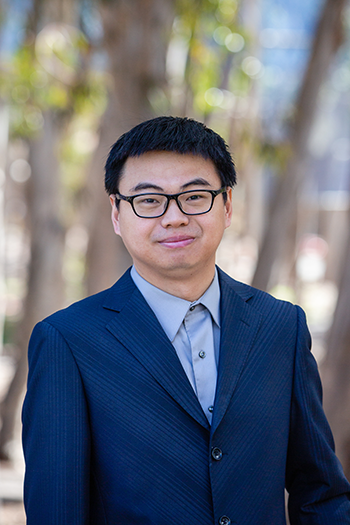Ming Xiao Receives Distinguished Teaching Award
June 22, 2023 | By Michelle Franklin
Associate Professor of Mathematics Ming Xiao has received the 2023 Distinguished Teaching Award for Academic Senate Members for his teaching excellence and contributions to pedagogy and mentorship at UC San Diego.
"We are very proud that the excellent teaching of Professor Ming Xiao and the very positive impact his teaching and mentorship has had on students has been recognized by this important award," said Department of Mathematics Chair James McKernan.
Read more about why Ming loves teaching, and how his work lets him escape from the “real world.”
Q: What area of math do you specialize in?
Ming Xiao: My area of expertise is called several complex variables, which means I do analysis of complex numbers with several variables.
Q: What is a complex number?
MX: We start with the square roots of the negative numbers, which are not real numbers — they’re called imaginary numbers. Then a complex number is the sum of a real number and an imaginary number. There are lots of remarkable and striking phenomena in the realm of complex numbers that are absent in real numbers. For example, complex numbers allow solutions to all nontrivial polynomial equations, even those that have no solutions in real numbers.
 Q: When did you first become interested in math?
Q: When did you first become interested in math?
MX:.When I was a child, I had a keen interest in number puzzles and math problems. I was also inspired by stories about renowned mathematicians like Gauss and Ramanujan. I guess it was during this period that my fascination with mathematics began to take shape. Prior to entering college, I discovered a growing interest in literature and physics as well. However, it was during my college years that I truly focused and dedicated myself to the study of mathematics.
Q: What do you enjoy most about teaching math?
MX: I thoroughly enjoy explaining mathematics to others and find great satisfaction in helping them appreciate its inherent beauty. Engaging in teaching has not only allowed me to assist others but has also contributed to my personal growth. Teaching has honed my listening skills and my ability to communicate my ideas with clarity and patience. I also find it is inspiring to interact with individuals from diverse backgrounds and areas of expertise.
As a teacher, I've gained a fresh perspective that I didn't possess as a learner. When trying to convey a concept effectively, I usually examine it from various angles. This, in turn, often leads to even more profound insights into the subject matter itself.
Q: You mention appreciating the beauty of math. What is it that you find beautiful?
MX: I was drawn to math because of its utilization of a logical and precise language, which eliminates any possibilities of ambiguity or potential for misinterpretation. Furthermore, the structure of mathematics captivates me. Since my days as a student, I often marveled at the process of learning classical mathematical theory akin to taking a tour through a meticulously constructed castle. I was always amazed by both the intricate details and overall architectural design. Towards the end of the tour, one gradually, and sometimes suddenly, realized why a door was placed in a particular spot or why a window was positioned there. What makes mathematics even more astonishing is that, as long as one is willing to invest time, one can even uncover the step-by-step process of how this magnificent castle was meticulously built, brick by brick, from its very foundation. Someday you can even try to construct your own buildings!
Q: What classes do you teach? Who are your students?
MX: I have taught a diverse range of classes, from lower-division undergraduate math courses, such as calculus, to upper-division undergraduate classes like real and complex analysis, which cover more theoretical aspects. The lower-division courses are often taken by students from majors like computer science and engineering. On the other hand, the upper-division classes cater more to mathematics majors. I also teach math graduate courses, some of which are designed to prepare students for their Ph.D. qualifying exams, while others delve into more advanced topics closely aligned with research.
Q: Do any teaching experiences stand out as memorable?
MX: Occasionally, I receive emails from my former students who have pursued graduate studies or found employment. In these emails, they express their gratitude for the mathematical training and critical thinking skills they acquired in my class, which have proven invaluable in their continuing studies and professional development. Hearing such feedback makes me believe that all the time and effort I invested in teaching was truly worthwhile.
Q: What is your favorite spot on campus?
MX: Taco Villa is among my favorite spots. Every Wednesday morning, our research group gathers for a seminar, and afterwards, we often take a lunch together at Taco Villa. Over the meal, we always have delightful conversations about mathematics, teaching and many other things. These moments are enlightening and refreshing. Not to mention, the food at Taco Villa is fantastic!
